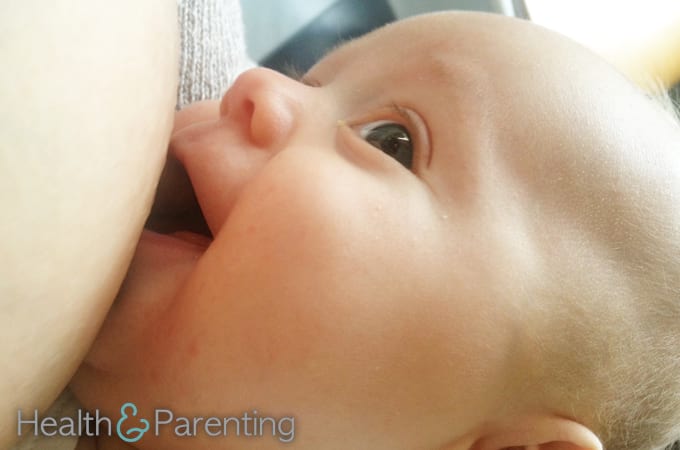Did you know at birth your baby’s stomach is the size of a chickpea? By day three, it’s about the size of a walnut, and not until day 10 is it as big as a golf ball. This small stomach size equals small stomach capacity – tiny tummies can’t hold much at once. The good news is that if you’re breastfeeding, your body has made your milk in just the right quantity for a growing baby’s stomach size.
Think of colostrum – your first milk – in teaspoons rather than ounces. It’s just the right amount for baby’s little belly. The nutrients in colostrum are perfect for a newborn, too. Colostrum is low in fat, and high in carbohydrates and protein. The antibodies in colostrum act as your baby’s first vaccine – they keep your baby healthy as his immune system is developing. Colostrum is easy for your baby to digest, and has a laxative effect to help prevent jaundice.
Because breastmilk so easy to digest, babies need to nurse often. Newborn babies typically nurse every 1 ½ to 2 hours. Most of the time, though, the feedings aren’t so evenly spaced. Sometimes baby will want to nurse every hour, and sometimes he will sleep for a longer stretch without waking to feed. Eight to twelve feedings every 24 hours is what you should aim for.
If your baby is having trouble latching in the early days, it’s important to get some nourishment into him. But using a breast pump for colostrum isn’t always effective. Because it is thicker than mature milk, and is produced in smaller quantities, colostrum is more easily hand expressed than pumped. Consider hand expressing colostrum onto a teaspoon, and then dribbling this into your baby’s mouth a little at a time. These calories will help sustain your baby as you work on getting him to latch.
With all of this in mind, here are some tips for successfully starting to breastfeed in the early days after the birth:
- Plan your birth for breastfeeding success: Pain medications in labor can result in sleepy baby in the early hours and days after birth. A sleepy baby may not nurse very often. This would be a good time to hand express colostrum and spoon feed it to your baby.
- Spend time skin-to-skin: As soon as your baby is born, ask that they place him skin to skin with you. Stay this way until the first feeding has taken place. Skin-to-skin contact helps baby adjust to life outside the womb and awakens breastfeeding reflexes.
- Nurse early and often: Most babies are ready to nurse about an hour after birth. Ask for help if you need it. Then continue nursing your baby on cue afterwards in order to bring in a strong milk supply.
- Room in: Keep your baby with you as much as possible after the birth. You will get to know your baby’s rhythms and hunger cues, which will help get breastfeeding off to a strong start.
- No supplements or pacifiers (dummies): Unless medically necessary, limit any formula or other supplements. If you do need to supplement, use a spoon, syringe or cup rather than a bottle. Also, try to limit using a pacifier or dummy until breastfeeding is well established. Your baby doesn’t need anything other than your milk at first!
Following some simple steps as you are preparing for breastfeeding will help you set the stage for a strong milk supply and a satisfied and healthy baby. You can also watch some educational breastfeeding videos in our Baby+ App. Click Baby+ iOS or Baby+ Android to install the App, and prepare for the arrival of your little one(s).
What concerns do you have about getting breastfeeding off to a strong start?
Written by Michelle: writer, editor, childbirth educator, lactation consultant, and mother to 4 busy kids
This information is not intended to replace the advice of a trained medical doctor. Health & Parenting Ltd disclaims any liability for the decisions you make based on this information, which is provided to you on a general information basis only and not as a substitute for personalized medical advice. All contents copyright © Health & Parenting Ltd 2018. All rights reserved.











